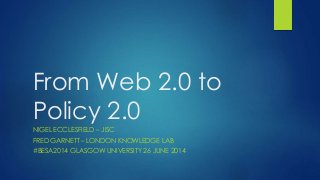From Web 2 0 to Policy 2-0
•Download as PPTX, PDF•
2 likes•734 views
An overview of a paper discussing how learning technologies & Web2.0 give us new ideas on participatory policy development; Policy 2.0. Presented at #BESA2014 Glasgow University 26 June 2014 Written by Nigel Ecclesfield & Fred Garnett
Report
Share
Report
Share

Recommended
Recommended
More Related Content
More from London Knowledge Lab
More from London Knowledge Lab (20)
Is Heutagogy the Future? (of Education) UNESCO submission

Is Heutagogy the Future? (of Education) UNESCO submission
Digital learning architectures of participation Book Cover

Digital learning architectures of participation Book Cover
Recently uploaded
Recently uploaded (20)
Energy Resources. ( B. Pharmacy, 1st Year, Sem-II) Natural Resources

Energy Resources. ( B. Pharmacy, 1st Year, Sem-II) Natural Resources
ICT Role in 21st Century Education & its Challenges.pptx

ICT Role in 21st Century Education & its Challenges.pptx
Basic Civil Engineering first year Notes- Chapter 4 Building.pptx

Basic Civil Engineering first year Notes- Chapter 4 Building.pptx
Mixin Classes in Odoo 17 How to Extend Models Using Mixin Classes

Mixin Classes in Odoo 17 How to Extend Models Using Mixin Classes
Micro-Scholarship, What it is, How can it help me.pdf

Micro-Scholarship, What it is, How can it help me.pdf
Role Of Transgenic Animal In Target Validation-1.pptx

Role Of Transgenic Animal In Target Validation-1.pptx
Python Notes for mca i year students osmania university.docx

Python Notes for mca i year students osmania university.docx
Web & Social Media Analytics Previous Year Question Paper.pdf

Web & Social Media Analytics Previous Year Question Paper.pdf
Russian Escort Service in Delhi 11k Hotel Foreigner Russian Call Girls in Delhi

Russian Escort Service in Delhi 11k Hotel Foreigner Russian Call Girls in Delhi
Ecological Succession. ( ECOSYSTEM, B. Pharmacy, 1st Year, Sem-II, Environmen...

Ecological Succession. ( ECOSYSTEM, B. Pharmacy, 1st Year, Sem-II, Environmen...
General Principles of Intellectual Property: Concepts of Intellectual Proper...

General Principles of Intellectual Property: Concepts of Intellectual Proper...
From Web 2 0 to Policy 2-0
- 1. From Web 2.0 to Policy 2.0 NIGEL ECCLESFIELD – JISC FRED GARNETT – LONDON KNOWLEDGE LAB #BESA2014 GLASGOW UNIVERSITY 26 JUNE 2014
- 2. What is Web 2.0?
- 3. Why Policy 2.0? Web 2.0 affordances offer the potential for; Participation Support for collaboration Emergent behaviours that are not predetermined Data use and analysis open to wider groups of users These potentials offer ways of considering and developing policy rapidly being lost in the UK, Europe and the USA Policy is best developed in open and wide-ranging contexts Web 2.0 technologies are good at capturing emergent behaviours so can be adopted to capture emergent learning Web 2.0 technologies can help overcome the partisanship of expertise ensnared in a lobby mentally In UK Education there is a growing disconnect between policy and practice that needs to be addressed
- 4. Our work with a policy link “Architecture of Participation” – Adaptive Institutions working across Collaborative Networks Public Value – emerging from dialogue and collaboration with publics not the views of senior managers in public services – see Lea (2008) Policy Forest out of Learner-Generated Contexts Emergent Learning Model, the PAH Continuum, MOSI Along
- 5. Government Policy FELTAG (Further Education Learning Technology Action Group) Matthew Hancock – Skills Minister BIS ETAG (Education Technology Action Group) Michael Gove – DfE David Willetts – BIS Matthew Hancock - BIS
- 6. Issues Policy as an “expert” activity – avoiding the mental model trap identified by Hase (2014) Decreasing participation in policy development Redefining the vocabulary of US commentators and adding dialogic and emergent learning perspectives Developing tools to increase participation in policy development Research leading rather than being funded by policy initiatives
- 7. Questions How do we; Start to talk to learners and colleagues to explore the impact of internal and national policies on your practice and experiences? Supplement all data gathering exercises such as the NSS in higher education with dialogue and start to feed he questions and answers that emerge from those discussions into reports and your feedback. for every consumer satisfaction question add a Socratic question such as “what questions should I ask to enable you to tell it as it is?” ask learners and colleagues difficult questions about how they experience existing policies and practice and, more importantly, how they might, individually and collectively seek to change these, without be afraid/intimidated? Ask for support and funding to research policy and time to contribute to “conversations” and consultations to address issues as you experience them? Take O’Reilly at his word and use the affordances of the Web 2.0 technologies to network and participate in chat and dialogue and network to find collaborators and stimulating challenges? Look at Mitra’s learners and learn from their openness to challenges and new experiences, unlearn the obsession with individualism and isolation in our professional lives Work with learners and colleagues as peers and participants to challenge policy and introduce changes in your work Ask any proponent of a new policy for the evidence of its value and the basis for their promotion of it
- 8. How would you do this? HOW WOULD YOU MAKE POLICY?
- 9. We would compare policies dialogically; Learner-centric Technology-centric DfE (ministry)-centric MORE ON ARCHITECTURE OF PARTICIPATION BLOG WATCH FOR BEFORE & AFTER POLICY FOR MORE IDEAS
- 10. Nigel Ecclesfield and Fred Garnett #nefg Full Paper From Web2.0 to Policy 2.0 n.ecclesfield@jisc.ac.uk @fredgarnett
